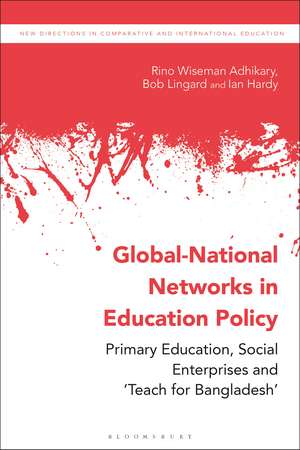Global-National Networks in Education Policy: Primary Education, Social Enterprises and ‘Teach for Bangladesh’: New Directions in Comparative and International Education
Autor Dr Rino Wiseman Adhikary, Professor Bob Lingard, Ian Hardyen Limba Engleză Paperback – 17 mai 2023
| Toate formatele și edițiile | Preț | Express |
|---|---|---|
| Paperback (1) | 191.22 lei 6-8 săpt. | |
| Bloomsbury Publishing – 17 mai 2023 | 191.22 lei 6-8 săpt. | |
| Hardback (1) | 568.87 lei 6-8 săpt. | |
| Bloomsbury Publishing – 3 noi 2021 | 568.87 lei 6-8 săpt. |
Preț: 191.22 lei
Preț vechi: 249.30 lei
-23% Nou
Puncte Express: 287
Preț estimativ în valută:
36.59€ • 38.38$ • 30.46£
36.59€ • 38.38$ • 30.46£
Carte tipărită la comandă
Livrare economică 01-15 aprilie
Preluare comenzi: 021 569.72.76
Specificații
ISBN-13: 9781350225091
ISBN-10: 1350225096
Pagini: 232
Ilustrații: 1 bw illus
Dimensiuni: 156 x 234 x 25 mm
Greutate: 0.33 kg
Editura: Bloomsbury Publishing
Colecția Bloomsbury Academic
Seria New Directions in Comparative and International Education
Locul publicării:London, United Kingdom
ISBN-10: 1350225096
Pagini: 232
Ilustrații: 1 bw illus
Dimensiuni: 156 x 234 x 25 mm
Greutate: 0.33 kg
Editura: Bloomsbury Publishing
Colecția Bloomsbury Academic
Seria New Directions in Comparative and International Education
Locul publicării:London, United Kingdom
Caracteristici
Comments more broadly on 'Teach for America/All' and its growing influence around the world
Notă biografică
Rino Wiseman Adhikary is Alfred Deakin Postdoctoral Research Fellow at Deakin University, Australia. Bob Lingard is a Professorial Fellow at the Australian Catholic University, Australia and Emeritus Professor in Education at the University of Queensland, Australia.Ian Hardy is Associate Professor in the School of Education at The University of Queensland, Australia.
Cuprins
Lists of FiguresSeries Editors' ForewordAcknowledgementsList of Abbreviations1. Teach For Bangladesh: Rethinking Comparative Policy Research in Education2. Theorising Policy Mobilities in Education3. Changing Governance of Primary Education in Bangladesh4. Social-Enterprising the Public Sector in Bangladesh5. Governing Teacher Education as Social Enterprise Through Teach For Bangladesh6. Learning from Researching Teach For Bangladesh as Social EnterpriseReferencesIndex
Recenzii
The world (of policy) is changing, and this poignant book highlights some of the many ways that policy networks, imaginaries, imbrications, and actors are coalescing to reconstitute the field of education.
The book masterfully documents the birth of a new type of NGO: one that is closer to the political elites than to the people. The global Teach for All movement recruits university graduates to become social entrepreneurs who will eventually reform or revamp the public sector. In a country that gained international acclaim for the mother of all NGOs - BRAC - and its vast number of community-based NGOs, the success story of Teach for Bangladesh is even more astounding. The authors draw on their case study to illustrate key concepts in comparative policy studies, globalization studies, and sociology of education.
This book provides a richly detailed empirical investigation of the way Teach for Bangladesh is reconfiguring the Bangladeshi public sector. The authors challenge a binary of methodological nationalism and globalism, identifying, and conceptualising, new spatialities and temporalities of globalisation that the field of comparative education urgently needs to recognise.
The book masterfully documents the birth of a new type of NGO: one that is closer to the political elites than to the people. The global Teach for All movement recruits university graduates to become social entrepreneurs who will eventually reform or revamp the public sector. In a country that gained international acclaim for the mother of all NGOs - BRAC - and its vast number of community-based NGOs, the success story of Teach for Bangladesh is even more astounding. The authors draw on their case study to illustrate key concepts in comparative policy studies, globalization studies, and sociology of education.
This book provides a richly detailed empirical investigation of the way Teach for Bangladesh is reconfiguring the Bangladeshi public sector. The authors challenge a binary of methodological nationalism and globalism, identifying, and conceptualising, new spatialities and temporalities of globalisation that the field of comparative education urgently needs to recognise.






